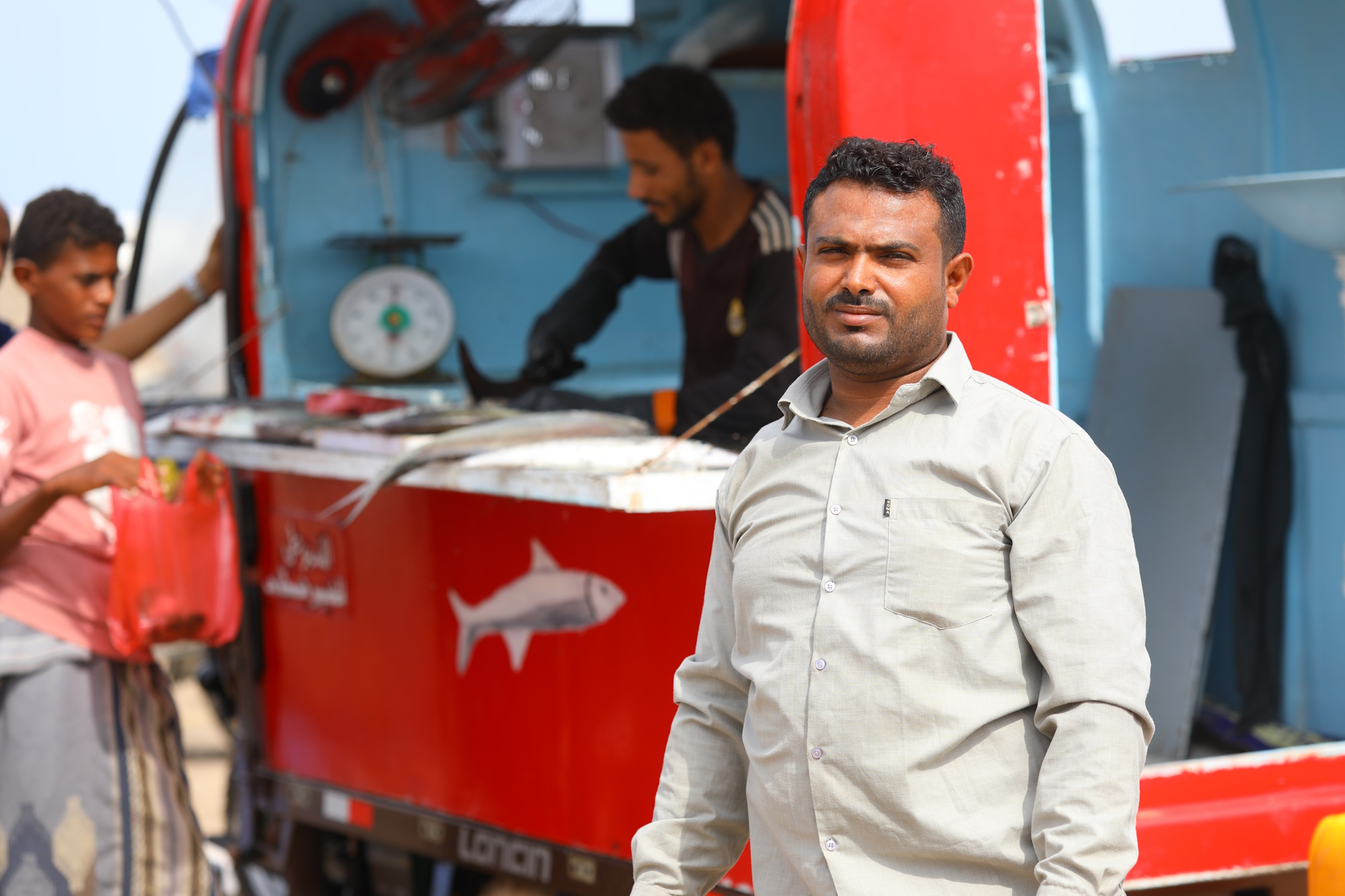Abdo’s story: Mokha’s mobile fish vendor
November 25, 2024

Abdo Aneebi, a 32-year-old fisherman from Mokha, Taiz
Abdo, is a 32-year-old fisherman from Mokha, Taiz Governorate, once known as Yemen’s most prominent port. As a young entrepreneur, Abdo has faced many challenges in securing a livelihood for his family against the backdrop of prolonged conflict in Yemen. Married with four children, Abdo graduated from high school and partnered with his brother to buy a fishing boat, eager to support his family through the sea's bounty. However, conflict brought soaring fuel prices and plunged the country into economic crisis, forcing Abdo to abandon his dreams of fishing. In 2017, he pivoted to selling fish.
Every day, Abdo would buy fish from vendors using mobile containers in Mokha, transporting them on his motorcycle in a simple basket. He sold the fish in small quantities, but his efforts were hampered by harsh weather conditions, a lack of clean working spaces, and insufficient funds to grow his business. Despite these challenges, Abdo's spirit remained unbroken.
In 2024, nearly two decades after he first cast his nets into the sea, Abdo received support from the United Nations Development Programme (UNDP) thanks to funding from the World Bank provided through the Sustainable Fishery Development in the Red Sea and Gulf of Aden (SFISH) project.
Implemented with local partner the Small and Micro Enterprises Promotion Service (SMEPS) the project supported Abdo with a fully equipped mobile fish vending unit—a lifeline that allowed him to transform his business.

Abdo receives and tests his fully equipped mobile fish vending unit.
Reflecting on his journey, Abdo emphasizes his determination to make the most of the support he received. He dedicated himself wholeheartedly to the project, participating in training courses. “As a fisherman for over two decades, these courses taught me things I never knew about fish. Our work used to be random, but now it's organized. They gave us information we never knew before,” he shares.
Abdo, along with 8,382 other trainees, learned essential skills including proper fish preservation techniques, ensuring the reduction of waste and increasing profits by 20%, even during the low season. Once he received his mobile unit, business began to flourish. Abdo now purchases larger quantities of fish and has expanded his operations, employing two additional workers. His innovative mobile cart, a first for Mokha, quickly became a local favorite, offering fresh, clean fish to eager customers.

Abdo showcases his catch at his new mobile fish shop in Mokha, Taiz, bringing fresh seafood directly to the community.
Abdo’s business, called “Abdo Aneebi for Fish,” has become a well-recognized name in the community. His cart is a familiar sight at the central market and other bustling spots, symbolizing resilience and hope. As his venture thrives, Abdo is not just focused on profits; he dreams of investing in a larger unit to expand his reach and ensure long-term sustainability.
By equipping fishermen like Abdo with the tools and knowledge they need, the SFISH Project is focused on ensuring long-term livelihoods and fostering environmental stewardship. Sustainable fishing practices play a critical role in combating climate change and protecting water resources. Commitment by fisherfolk like Abdo to preserve fish stocks and maintain green practices contributes to healthier marine ecosystems, ensuring that future generations can enjoy the bounty of the sea.
The SFISH project promotes regional cooperation for sustainable fishery management while strengthening the fishery value chain in Yemen. More information: Sustainable Fishery Development in the Red Sea and Gulf of Aden

 Locations
Locations



